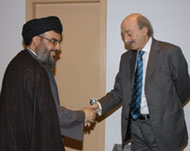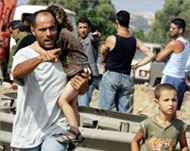Lebanon divided over Hezbollah raid
With aerial bombardment and a naval and land blockade of Lebanon intensifying, many Lebanese are divided over Hezbollah’s capture of two Israeli soldiers.

Some politicians have expressed doubt about or condemned Hezbollah’s cross-border raid on Wednesday.
Michel Aoun, a member of parliament who leads the Free Patriotic Movement, called the raid a “pure military action” but also condemned Israel’s retaliatory attacks on civilian targets.
“The priority now is to stop military operations and move towards a solution through negotiations,” Aoun, a former general who returned from exile last year, told Aljazeera.net.
Aoun, a Maronite Christian leader, signed an understanding with Hezbollah in February after arguing that the Islamist group should be integrated into political reforms in Lebanon.
Blame game
Walid Jumblatt, a Druze leader who opposed Aoun’s arrangement with Hezbollah, called the group’s raid an “outrageous” way to drag the country into war and said it was symptomatic of regional power-plays.
 |
|
Jumblatt (R): Hezbollah has |
“Iran and Syria are unfortunately using Lebanon as their proxy, and this is unacceptable,” he said.
Jumblatt, who heads the Progressive Socialist Party, has since the assassination of former Lebanese prime minister Rafiq al-Hariri demanded an end to Syrian involvement in national affairs and for the Islamist Hezbollah movement to lay down its arms.
But Hezbollah officials say the only way out is through indirect negotiations.
Sayyed Ibrahim Moussawi, editor of the English service of Hezbollah’s Al-Manar TV, blamed Israel for refusing to “limit any further escalations of aggression … and starting a military aggression against Lebanon”.
Angry, fearful memories
Once known as the Paris of the Middle East, Beirut was a popular tourist destination in the 1960s and 1970s.
After the civil war and the Israeli invasion of 1982, Lebanon’s fortunes faded until a decade ago when the guns fell silent and foreign investment and tourism returned to the country.
But the recent bombings and talk of war have brought back painful memories.
“This brings back too many bad memories” says Hawa Shehadi, a 70-year-old grandmother. “Lebanon will never know peace.”
Kamil Makdissi, a taxi driver, says: “I feel sad about Lebanon being bombed. Deep down I am happy that Israel is feeling at least 5% of what we’re going through.”
|
“This brings back too many bad memories. Lebanon will never know peace” Hawa Shehadi, 70 |
Many in Beirut are also angry.
Ordinary Lebanese opposed to Hezbollah are incensed by the attack they knew from experience would invite Israeli reprisals.
“This whole saga has taken me back to my childhood and it’s not a good feeling at all. I just want to get out,” says Zina Bekdache, 38, who is in Beirut for her annual holiday.
“They seem to think that they run the country,” says Walid Chahine, a 50-year-old engineer. “All the credibility Hezbollah had gained domestically over the years they have thrown away.”
Despite the anger, few Lebanese feel they can openly oppose Hezbollah while their country is under bombardment.
Wide gulf
Yet the gulf is clear between Lebanese Shia – the largest religious community in the country – and those opposed to the raid.
 |
|
Lebanese are divided over |
Dalia Salaam, a Lebanese Middle East analyst, says, “Hezbollah is currently the only political party in Lebanon fighting to save the country.”
“The US and Europe should ask Israel to restrain itself. After all, no one, not even President George Bush or the Israeli government, can afford to escalate the situation.”
But Ramzi Salha, a travel agent, says: “Whatever the agenda of Hezbollah is, it is not necessarily the agenda of the Lebanese people.
“They have not been designated by the Lebanese people to decide what is best for the country.”
With the 22-year Israeli occupation over, many Lebanese say it is time for Hezbollah to lay down its weapons as demanded by UN Security Council resolution 1559.
Few are suggesting a return to war is coming, but Hezbollah’s rivals are increasingly complaining that the only Lebanese group that was allowed to keep its weapons after the civil war has become more powerful than the state.